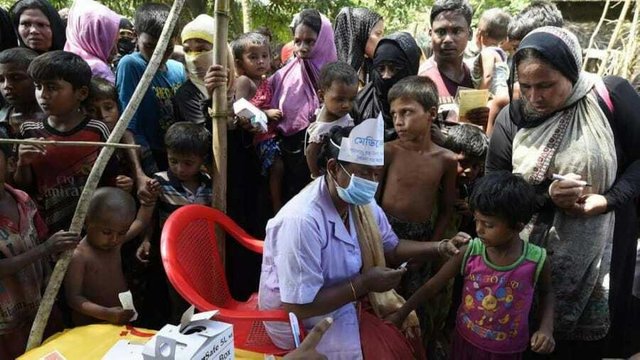
United Nations Children and Cultural Organization UNICEF has said that urgent efforts to help 7 million 20 thousand Rohingya children are threatened with deprivation of ongoing violence and fundamental rights in the upcoming cyclone season.
In a report released on Friday February 23 in the six months beginning of the recent dawn of Rohingya refugees in Bangladesh, UNICEF said that the disastrous and unhealthy Rohingya camps could be flooded due to floods created in the coming cyclone season. And if that happens, the incidence of water borne diseases will increase. This may stop the clinics, child-education centers and other institutions for children.
According to the report, approximately 1.55 thousand Rohingya children remain in Myanmar's Rakhine state, who are in fear and fear of violence. Because of such situation, many of their relatives and neighbors escaped from there. There are approximately 5,34,000 Rohingya refugee children in Bangladesh who came to Bangladesh with Rohingya refugees last year and earlier.
UNICEF's emergency program director Manuel Fountain said, "About 720,000 Rohingya children are basically trapped! Either they are in a limb due to violence or have been forced to change their residence within Myanmar or have not been able to return to the country are trapped in the crowded camps of Bangladesh.
He further said, 'It is a crisis which has no immediate solution and if there is no concerted effort to resolve the main cause, it can take several years to resolve.'
Rohingyas enter Bangladesh after reaching hundreds of kilometers in a remote place Photo: Focus Bangla
Rohingyas have entered Bangladesh after reaching hundreds of kilometers in a remote place. File images
It is mentioned in the report that the Rohingyas who are expelled from their homes and communities are now floating communities. These people, who are facing new threats to health and life, are also deprived of their fundamental rights.
UNICEF urges the Myanmar government to stop rakhine tolerance by referring to the restrictions imposed on the freedom of movement of Rohingya people, their very limited healthcare, education and livelihood opportunities, and their continued reliance on humanitarian assistance.
It has been said in the report that if recognizing the fundamental rights of the Rohingya people, it could create a situation for refugees returning to their previous home in Myanmar.
Manuel Fountain commented that Rohingya will not return home until security and security guarantees, citizenship, opportunities for giving children a chance to go to school, and not having a good future opportunity.
The work of UNICEF and other human rights organizations has been severely hampered due to the absence of access to many parts of Rakhine state since August 2017.
Temporary refuge camp has been built for Rohingyas in Ukhia. Photo: Focus Bangla
Temporary refuge camp has been built for Rohingyas in Ukhia. File images
UNICEF says it is essential to give an opportunity to reach these children immediately and without any doubt. At the same time, long-term efforts are also essential to identify inter-communal concerns and to highlight social co-status.
According to the report, disaster has been avoided by the efforts of the government led and supervised surveillance, where local residents gave shelter to 79 thousand Rohingyas. UNICEF has been part of a comprehensive international initiative to help dig the wells of water, establish thousands of latrines and help in the prevention of vaccination programs to protect children from cholera, measles and other diseases.
On the other hand, on August 25 this year, millions of Rohingyas have taken shelter in Teknaf and Ukhia refugee camps in Cox's Bazar district of Bangladesh to save lives after the raids against Rohingya in Myanmar's Rakhine state. 90 percent of those women, children and old people.